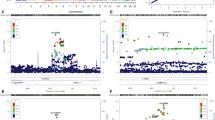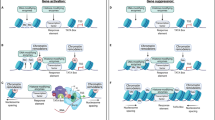Abstract
Physiological dependence and associated withdrawal episodes can constitute a powerful motivational force that perpetuates drug use and abuse. Using robust behavioral models of drug physiological dependence in mice, positional cloning, and sequence and expression analyses, we identified an addiction-relevant quantitative trait gene, Mpdz. Our findings provide a framework to define the protein interactions and neural circuit by which this gene's product (multiple PDZ domain protein) affects drug dependence, withdrawal and relapse.
This is a preview of subscription content, access via your institution
Access options
Subscribe to this journal
Receive 12 print issues and online access
$209.00 per year
only $17.42 per issue
Buy this article
- Purchase on Springer Link
- Instant access to full article PDF
Prices may be subject to local taxes which are calculated during checkout



Similar content being viewed by others
References
Metten, P. & Crabbe, J.C. Pharmacological Effects of Ethanol on the Nervous System (eds. Deitrich, R.A. & Erwin, V.G.) 269–290 (CRC Press, Boca Raton, 1996).
Reich, T., Hinrichs, A., Culverhouse, R. & Bierut, L. Am. J. Hum. Genet. 65, 599–605 (1999).
Mackay, T.F. Annu. Rev. Genet. 35, 303–339 (2001).
Buck, K.J., Metten, P., Belknap, J.K. & Crabbe, J.C. J. Neurosci. 17, 3946–3955 (1997).
Buck, K., Metten, P., Belknap, J. & Crabbe, J. Mamm. Genome 10, 431–437 (1999).
Fehr, C., Shirley, R.L., Belknap, J.K., Crabbe, J.C. & Buck, K.J. J. Neurosci. 22, 3730–3738 (2002).
O'Brien, R.J., Lau, L.F. & Huganir, R.L. Curr. Opin. Neurobiol. 8, 364–369 (1998).
Becamel, C. et al. J. Biol. Chem. 276, 12974–12982 (2001).
Milligan, G. & White, J.H. Trends Pharmacol. Sci. 22, 513–518 (2001).
Shen, K.Z. & Johnson, S.W. J. Physiol. 505, 153–163 (1997).
Fehr, C. et al. Genes Brain Behav. 3, 8–19 (2004).
Metten, P. & Crabbe, J.C. Behav. Pharmacol. 5, 533–547 (1994).
Acknowledgements
We thank J. Crabbe and J. Belknap for helpful discussions. Supported by US National Institutes on Drug Abuse and National Institute on Alcohol Abuse and Alcoholism grants (RO1AA11114, RO1DA05228, P50AA10760, RO1AA06243 and F31AA13685).
Author information
Authors and Affiliations
Corresponding author
Ethics declarations
Competing interests
The authors declare no competing financial interests.
Supplementary information
Supplementary Table 1
Candidate gene primer sequences used for tissue expression panel (exp), sequencing (seq), and quantitative RT-PCR (RT-PCR). (PDF 93 kb)
Rights and permissions
About this article
Cite this article
Shirley, R., Walter, N., Reilly, M. et al. Mpdz is a quantitative trait gene for drug withdrawal seizures. Nat Neurosci 7, 699–700 (2004). https://doi.org/10.1038/nn1271
Received:
Accepted:
Published:
Issue Date:
DOI: https://doi.org/10.1038/nn1271



